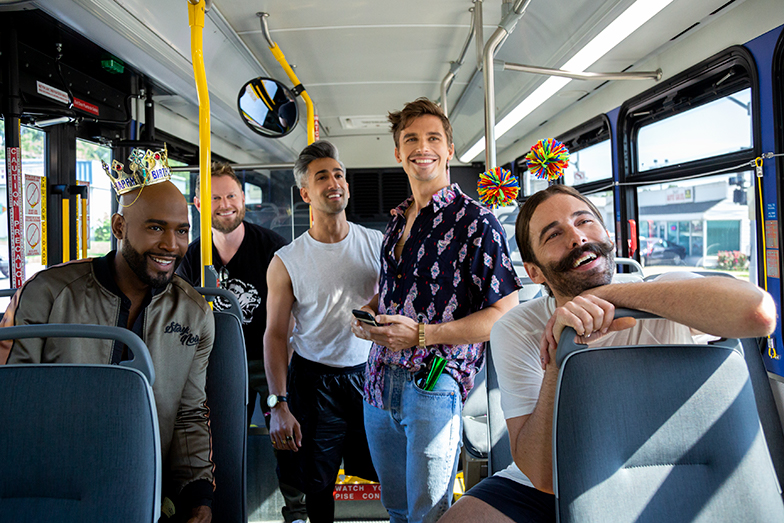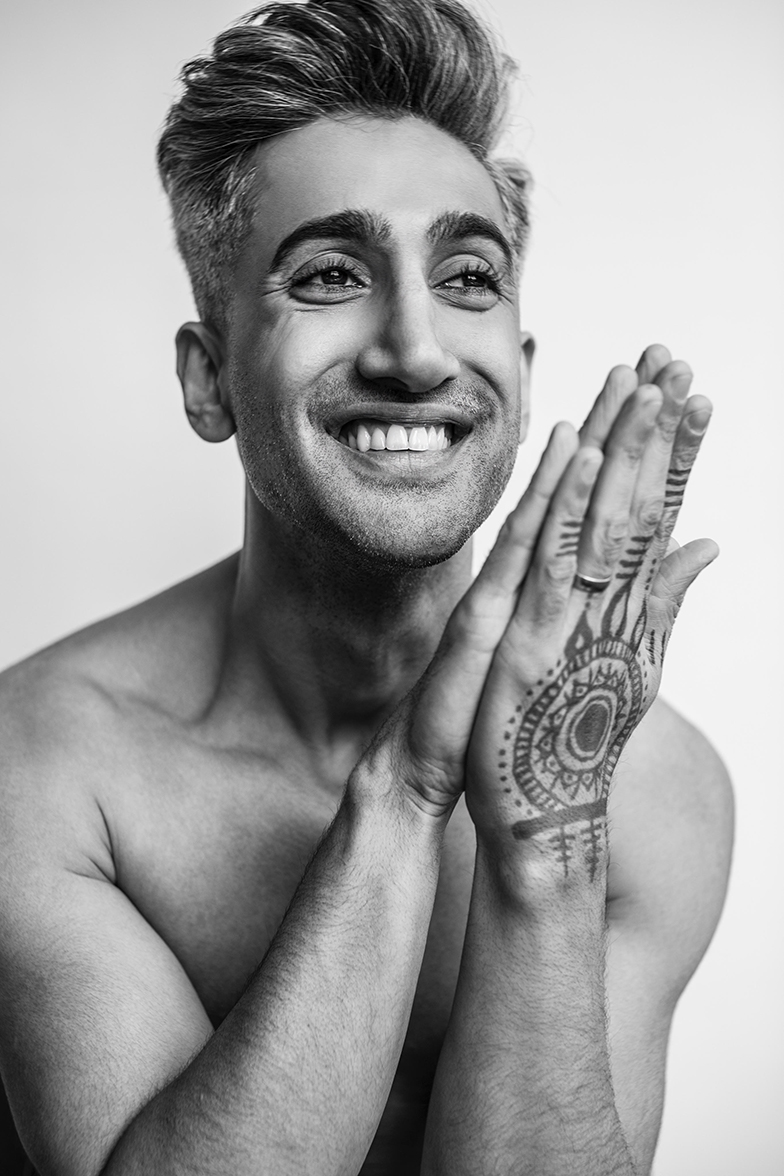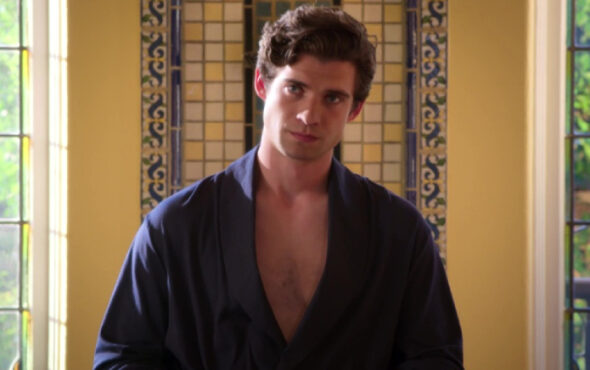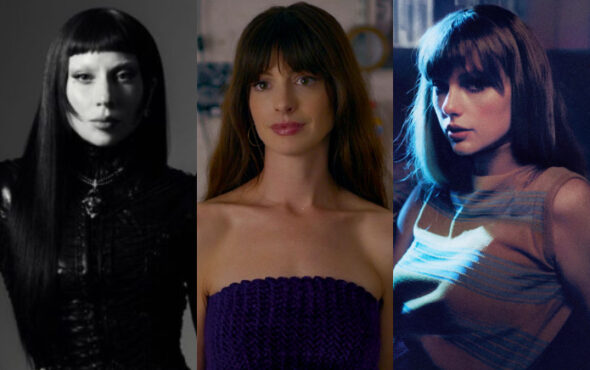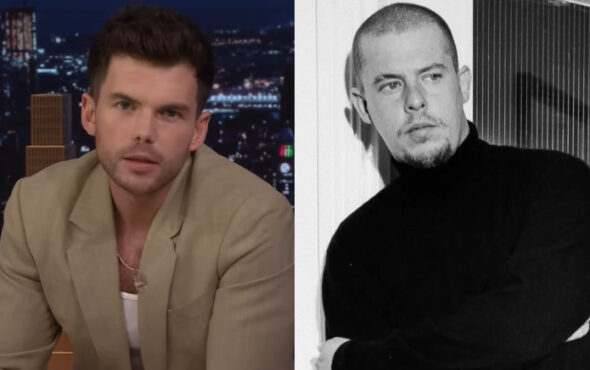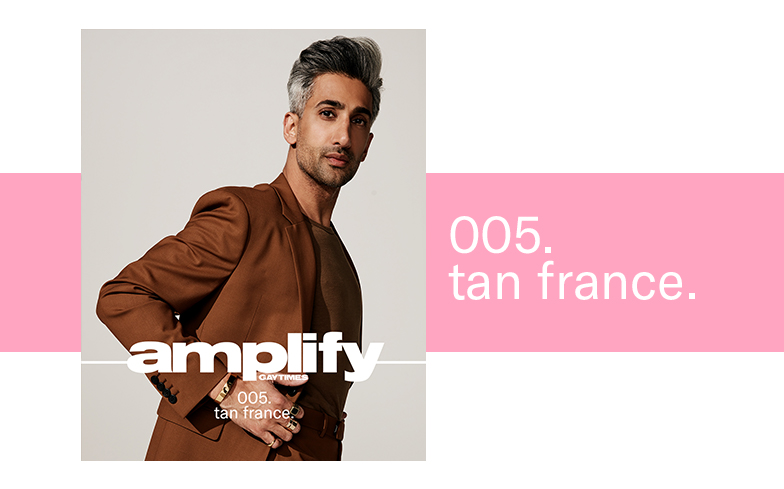
As one fifth of the thoroughly modernised Fab Five, Tan France has been catapulted on to TV screens around the world, and in doing so has found himself – arguably without his consent – as the immaculately-dressed embodiment of British gay Asian men.
It’s a lot of pressure, as he readily admits, and that’s only intensified by the fact that he’s one of the only people representing all the communities that he’s a part of on such a huge platform like Netflix. “It was the thing that worried me most when going into the show,” he admits. “I know we’ve had gay Asian men on TV in the UK, but a gay Asian man in the US on a global show, that hasn’t been done before, and so I don’t just represent Asians for a UK audience, I represent Asians globally at this point, and that’s a lot of pressure for one person.” While there are often calls for more diversity and representation in the media – as there should be – it’s important to remember that minorities who manage to break through are inevitably burdened with immense responsibility and a higher level of scrutiny than most, something that can be hard to deal with.
“I don’t think anyone should ever desire to be the first at anything like this,” Tan continues, “because there’s so much pressure on you to be perfect in every way, and that’s so stifling. I’m reminded of that every day. Every time I do something, the press will report on that thing as if I speak for every Asian person, or every gay person, or every brown person, or every immigrant. It’s frustrating, because I don’t, I speak for myself only. But I do love that I get to represent marginalised communities, because I’m constantly trying to do the most to make sure that I’m representing my communities in the best way.”
As a young Asian gay boy growing up in South Yorkshire, did Tan ever feel like he had someone like him to look up to? “No. The short answer is no,” he says bluntly. “I hoped for it, but I didn’t think I would ever see it in my lifetime, a version of me on a global platform. I didn’t think there were going to be opportunities. It wasn’t because we didn’t want to represent ourselves, there just wasn’t an opportunity. I don’t think even with the original iteration of Queer Eye that they would’ve had an Asian person on the show, it was always a case of, ‘Let’s share these caucasian stories, or maybe a black story’, but I still don’t see Far East Asians represented anywhere near enough, especially gay Far East Asians. Yeah, I just didn’t think there would be a time where people would go, ‘Oh, we should probably represent these people also’. So I’m still shocked to be on this show.”
It’s this continued lack of representation that inspired him to not only take up a place in the Fab Five, but also to write his memoirs, Naturally Tan, which will be released later this year (6 June, get it pre-ordered). He does admit, however, that he initially turned down the offer to write the book. “When a publishing house reached out and asked if I wanted to write a book, I said, ‘Absolutely not, I don’t have a story’,” he recalls. “They came back and said, ‘You joined Queer Eye because you have a story, and you want to fight for representation of people like you’, and I thought, ‘Oh shit, you’re right, I probably do have a story to tell’. And so I was reminded of that every day when I was writing the book.”
The finished product took a year to write, and saw him draw on some of the most “incredibly personal” experiences of his life, including the discrimination he’s faced. “I talk about the fact that people were fucking heinous and racist and homophobic towards me, but I find a way to make light of it and make it an easily digestible book. I’m very proud of everything I’ve achieved until now, especially with Queer Eye, but the book is the thing I’m most proud of. And it’s not just a book for Asian people, of course I want them to read it and feel like they’re reading about themselves in the pages, but I also want straight white cis people to read this. The gays and the girls are low-hanging fruit, I’m hoping they’ll read it because they know me from the show, but I also want straight white cis men to read it and think, ‘Oh, I should probably never call somebody a fucking Paki ever again’.”
While the book may be the most intimate project he’s ever released, he’s hesitant to reveal everything about his personal life. “If you’ve seen the show, you will know that I have the most boundaries, and I share the least of us all,” he says. When flanked by outgoing personalities like Jonathan van Ness and Antoni Porowski, Tan may indeed be the most reserved of the Fab Five, but in person he’s incredibly warm and thoughtful – the kind of guy you’d actually be friends with in real life. “I share more than you will ever have heard on the show, but there are still certain parts of me that I don’t share in the book. There are very intimate details within my friendships, or my marriage, or my family. I never set out to give myself completely to the public eye, I would never do that, I like to keep some things to myself because I want to feel like I’m still Tan that my husband knows, not just Tan that the world knows.”
In just over a year, Netflix’s reboot of ‘00s reality series Queer Eye became an unexpected smash hit, as the addictive makeover show and it’s cast of Tan, Karamo, Jonathan, Antoni and Bobby won hearts around the world. It’s hard to think of another show that’s gained such an incredible following in such a short amount of time. “I think the fact that it’s super positive is such a shock to the system,” Tan explains of the show’s popularity, “because as far as reality TV goes, we’re so used to seeing vapid, vile personalities on TV who are constantly fighting, who are constantly aggressive, who are showing a version of the world that I don’t think the world wants to see anymore. We already see that, that’s called news now, unfortunately.”
Tan points to the divisive Brexit vote in the UK, and the election of a bigoted president in the US, as examples of the negativity and hatred that are leaving viewers fatigued and longing for something more wholesome. “We see such hatred in the media, and so I think that our show helps counter-balance that, and shows people that we are actually a lot more similar than we are different. I think the timing of that was perfect. But also, I think people are really connecting with how kind me and my boys are with each other. It’s really nice to see five gay men who are so supportive of each other, and aren’t trying to tear each other down.”
While the original ‘00s series, Queer Eye for the Straight Guy, was relatively narrow in both the ‘heroes’ it featured and its representation of what it means to be queer, the reimagined Netflix version has committed itself to exploring all aspects of the community. As well as the typical straight men, the show has given makeovers to gay men, women, and a transgender man. Not resting on its laurels, the upcoming third season breaks even more ground, featuring a lesbian for the first time, and also a dual makeover of sisters Deborah and Mary, who are sure to become fan favourites.
“I just want to continue to champion diversity in every sense, not just within the LGBTQ community,” Tan says. “I want to share stories you haven’t heard before.” Both the lesbian hero, Jess, and the premiere episode’s hero, a gun-loving female who only wears camouflage, defy stereotypical expectations of what a woman should be or should look like, and in a world that’s slowly becoming more understanding that both sexuality and gender aren’t restricted to traditional binaries like gay or straight, masculine or feminine. “It’s something that myself and all of my boys really do encourage,” Tan continues. “I don’t want to only display the masculine side of myself, there’s also the feminine side of myself, and every one of us has that, whether you’re straight or gay. We do try and encourage everybody that we work with on the show to express themselves.”
As well as encouraging diversity, Tan reveals that the Fab Five use the show as a way to get conversations about various human rights and political issues into the homes of mainstream audiences. In the aforementioned premiere episode of season three, Tan engages with Jodie about her love of hunting and guns, and the two find common ground on what is arguably one of the most divisive issues in America, both calling for stricter laws on gun ownership. “What you don’t get to see on the show is that, behind the scenes, we are constantly fighting for the things that we want to talk about,” he says. “We get a brief about the person a week prior, and that’s how we can decide where we want to take them, but when we meet them we get to find out who they really are. From that initial meeting, which is what we call ‘discovery’ or ‘ambush’, it’s the five of us and we go into their home, we get to ask them a few questions, and then from that we get to talk about the things we individually want to talk about.”
“I pushed really hard to be able to talk about guns,” he continues. “There were guns all over Jodie’s home, it’s not something we have in our homes in England, and I wanted to talk about the differences in gun laws between the UK and the US because the gun laws in the US are very unique to them, and this is a global show. I wanted to talk about how bizarre it is for the rest of the world to see that people can just carry guns, you don’t need a license to carry a gun anymore, you can walk into a gun show in the US and not have to show ID or wait to get a gun, you can get one there and then. So it was really important for me to talk about those topics, and at least have that conversation.”
In the current day, Tan has reached a place where he’s confident in himself and happy with his life and career. Like many queer people, that wasn’t always the case, and growing up gay and Asian in a time that had far less tolerance for diversity than there is now was undoubtedly a struggle – but Tan is living proof that things really do get better. As a closing note to our interview, he has a message for his younger self.
“This is cheesy, but I’ve lived in America for a long time,” he prefaces. “I would say: Be your own support system, be your own role model, do everything you can to make sure you’re making yourself happy. You don’t have to look to external people to find yourself, or to find your value. I am very, very happy that I’m able to provide that for people now, for people to be able to watch this show in a small village in India or Pakistan and think, ‘Oh, that person looks like me, they come from my background, and they’ve been able to achieve this, they’ve been able to find somebody to love, to be in a very happy marriage’. I love that I’m there now, and that I’m able to give that to people. But going back to my childhood self, I wish I’d had that strength of character back in the day to say, ‘You don’t necessarily need that, you can find it within yourself’.” Whether told to his younger self or a queer kid still struggling in 2019, it’s great advice to follow.
Queer Eye season three will be available to stream on Netflix from 15 March.
